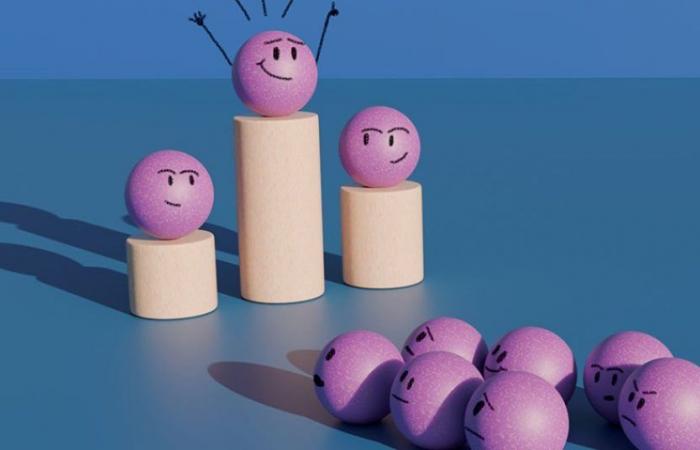In the movie Dead Poets Society, Professor John Keating, played by actor Robin Williams (1951-2014), encourages students to live today. “Make your lives something extraordinary,” he teaches. Carpe Diem (“Enjoy the day”in Latin) is not a creation of American screenwriter Tom Schulman, winner of the Oscar for original screenplay, but a quote from the Roman poet Horace (65-8 BC).
The expression is also the title of the fourth chapter of the psychiatrist’s newest book Daniel Martins de Barros, Living Is Better Without Having To Be The Best (Sextant – click to buy). Each chapter of the work is supported by a maxim from Arcadianism, a literary movement that revived principles from classical antiquity. The other three are: Inutilia Truncat (“Cut out the useless”), Aurea Mediocritas (“The golden mediocrity”) and Flee Urbem (“Get out of town”).
Barros, who is a professor at USP, assumes that the desire to always want to come first can create a sick society. In the year of the Olympics, here’s a tip for athletes and fans: participating in the most famous sporting competition on the planet is equally or more important than winning a medal.
As Baron de Coubertin (1863-1937), responsible for creating modern games, would say, “The important thing is not to win, it is to compete”. Check out the interview with the author, who, in addition to being a doctor, has a bachelor’s degree in philosophy and a doctorate in science.
Living is better without having to be the best
Continues after advertising
How did the idea of writing come about? Living Is Better Without Having To Be The Besta book that, as you say, challenges the supremacy of victory?
On one occasion, I was invited to speak at a high performance event. At the time, I joked, saying: “But can’t it be average performance? Does it have to be high?” I even thought about the supposed title of the talk: “The secret of low performance: mediocrity as the key to happiness”… [risos] I had been thinking about this for some time, you know? About us never being satisfied with what is good and always living looking for even better.
That was the spark that gave rise to the book: we need to talk about the pressure of high performance. Because, to be honest, we are all average! It was then that I remembered one of the mottos of Arcadianism: the Aurea Mediocritas. As Aristotle would say, virtue is in the middle.
But we live in a society that exalts high performance. How dangerous is that? Can it make us sick?
Is being excellent bad? Of course! Being excellent is… excellent! [risos] It’s great that there are people who are always wanting to go further. The problem is creating a society that only values high performance. A society that only values first place or a gold medal.
This can be sickening. There is not room for everyone on the podium. Neither gold medal nor CEO vacancy. If the only thing that matters is the great, the excellent, then most people may think they have no value. Worse: you may feel frustrated, defeated, and so on. Is winning first place on the podium legal? AND. But that’s not the only thing that has value in life. This is the big message of the book.
In the work, when talking about stoicism, you define it as “the serene acceptance of life’s circumstances based on the distinction of what is or is not under our control”. Doesn’t that sound conformist?
Yes, you can, it’s always a risk. Just like saying that “the average is good” can be interpreted as an exaltation of defeat. But what Stoicism preaches is: don’t accept everything! Okay, not everything is in our control, but there is a lot that is. You see the Greeks or the Romans, for example.
Continues after advertising
They simply transformed the world. They didn’t think like this: “Ah, there’s no water here… Patience, let’s go somewhere else then”. None of that! What did they do? If there was no water, they built aqueducts. For Stoics, the only thing we can control is how we react to external events. It has more to do with our emotional responses to life’s circumstances.
Each chapter of the book has as its title an Arcadian maxim to reflect on. Which one do you identify with most?
Wow, you got me, huh? [risos] I like them all, but if I had to choose just one, I think I would go with Carpe Diem. I like the idea of enjoying the present moment and not letting life go unnoticed. I’ve been trying hard to live in the now, to pay attention to what’s happening around me.
This is an effort, you know? We have to strive to get off autopilot and pay attention to our daily lives. It’s quite a challenge, but it’s a rewarding challenge. So, I think that’s one of the highlights of the book: paying more attention to what’s happening around us because tomorrow we can’t even be here anymore.
Continues after advertising
At one point, you write that “the easy path always leads to ruin”. It’s as if saying: “Long live the difficulty!” However, couldn’t exalting or romanticizing suffering be harmful to mental health?
Sometimes, we wait for life to bring what we expect from it. At other times, we are content to simply follow the river’s current. One way or another, we are not going to enjoy the best of life. For anything, we have to make effort or spend energy. Either to pay attention to what happens around us (Carpe Diem), or to separate what is useful from what is not (Inutilia Truncat).
Being happy on average doesn’t mean you don’t care about anything. Effort is necessary if you want to enrich your life and live the possibilities it offers. What we achieve without effort does not bring satisfaction or promote growth.
In addition to writing books, you teach, see patients, write columns, post videos on YouTube… What precautions do you take to avoid succumbing to burnout, another topic covered in the book?
I try to rest a lot. There was a time, when my children were little, when I shortened my sleep hours a lot. I slept little. That was when I felt tired that looked more like depression. I only know it wasn’t depression because I slept more and got better.
So I pay a lot of attention to rest. And when I talk about rest, I’m not just talking about sleeping. I also talk about disconnecting your mind from work. If we don’t do this, we can’t handle it. We think that resilience is how much a person can handle. It is not. Resilience is how much a person rests to be able to continue moving forward.
What habits acquired during the Covid-19 pandemic, a period that demanded resilience from all of us, do you maintain to this day? Is bird watching one of them?
Undoubtedly! Watching birds became a hobby. I bought powerful lenses, learned to identify species, joined discussion groups. During the pandemic, watching them was a stress reliever. Now in January, I traveled and met new birds. I didn’t travel for this, but during the trip I saw a black-headed goldfinch that I had never seen before.
Continues after advertising
The pandemic has made it very clear how much we need to take care of ourselves. If we don’t pay attention to this, everything goes back to the way it was before. Today I try to create breaks to rest. As? Having fun, watching birds, it doesn’t matter. The important thing is to create green areas for our brain to breathe.
Share this article via:
Tags: Mania perfection source illness
--





